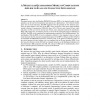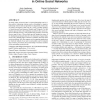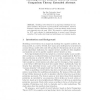773 search results - page 14 / 155 » A Computational Model of Social Perlocutions |
IPPS
1998
IEEE
13 years 11 months ago
1998
IEEE
The paper presents how the Random PROLOG Processor (RPP), a bio-inspired model of computations, can be used for formalization and analysis of a phenomenon - the Collective Intelli...
WWW
2010
ACM
14 years 2 months ago
2010
ACM
We study online social networks in which relationships can be either positive (indicating relations such as friendship) or negative (indicating relations such as opposition or ant...
ACII
2007
Springer
14 years 1 months ago
2007
Springer
Recent years have seen an explosion of interest in computational models of socio-emotional processes, both as a mean to deepen understanding of human behavior and as a mechanism to...
ACRI
2006
Springer
14 years 1 months ago
2006
Springer
on Theory: Extended Abstract Natalie Fridman and Gal Kaminka Bar Ilan University, Israel The MAVERICK Group Computer Science Department {fridman,galk}cs.biu.ac.il Abstract. Modelin...
ICONIP
2010
13 years 5 months ago
2010
Collective decision making involves on the one hand individual mental states such as beliefs, emotions and intentions, and on the other hand interaction with others with possibly d...



